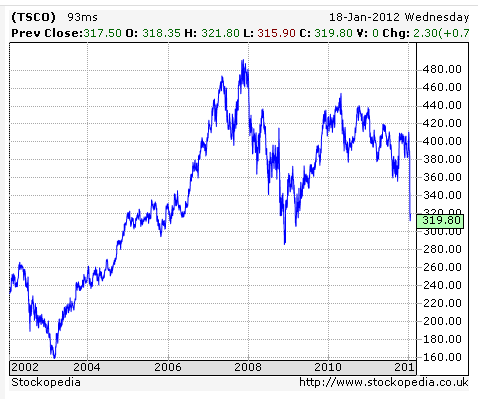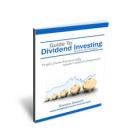Tesco (LON:TSCO) is the largest supermarket in the UK with over 2,000 stores here and around half a million staff worldwide. It’s a monster. It’s the dominant player in a recession-proof industry and has Warren Buffett on board as a major investor. So if the Christmas results for a single year were a bit disappointing, investors would just shrug it off… right?
Wrong.
As is so often the case the short-term market players have the power, at least in the short term. With so many retailers struggling and more falling by the wayside every day, even the slightest bit of bad news seems to have massive repercussions regardless of who they relate to.
So the question is:
Was Buffett wrong to invest in Tesco?
Let’s take a look at a long term price chart:
That’s not quite as miserable for long term shareholders as some other companies, but we are still back at prices seen previously in 2005, some 6 or 7 years ago.
Investors over the last few years may be a bit disappointed (except those that bought in the depths of the credit crunch), but what about now? How does the investment case stack up from the point of view of an ‘average’ investor?
For this type of company I use a 6-step process for the initial review, which is an extension of the principles outlined by Ben Graham for what he called ‘defensive’ investors, who were typically people building or living off of a retirement fund.
Focus on defensive qualities first
Risk management is important for defensive investors, hence the name. Ben Graham suggested three main steps to check that an investment has sufficient defensive qualities.
If you already recognise that Tesco is a pretty indestructible company, feel free to skip on ahead to the ‘pay a low price’ section below.
Step 1 – Look for diversity
This primarily relates to holding a sufficient number of companies in a wide range of unrelated industries, but it also applies to the individual companies themselves.
There are many ways that a company can be diverse and for Tesco it comes primarily from operating in many different locations, both within the UK and internationally. If a particular store or geographic region performs badly because of local issues, the rest of the company…














